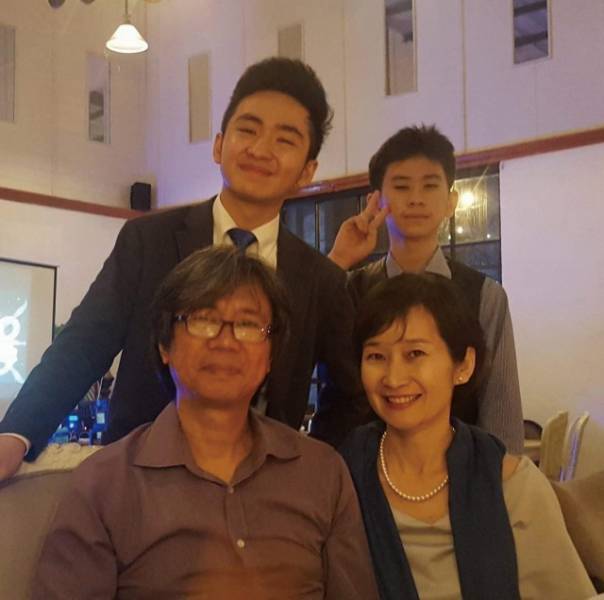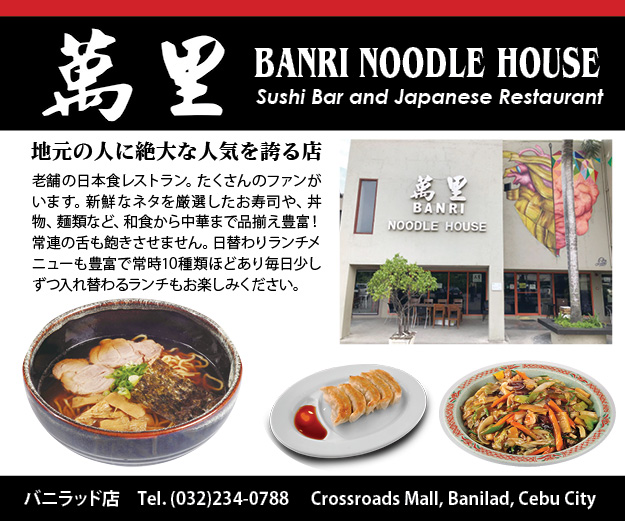【マニラで考える異文化コミュニケーション】
毎日が異文化コミュニケーション!? フィリピン在住の国際結婚カップルインタビュー
アリエル・ヘロニモさん 日系企業勤務。ブラカン州バリワグ町出身。
野村幸代さん 高校教員。広島県広島市出身。ブラカン州バリワグ町在住。
日本で2年、フィリピンで5年の交際期間を経て1999年4月に結婚、今年で23年目。「21歳と18歳になる息子2人は今、広島にいます。上の子は大学4年生で、下の子は今年5月にフィリピンの高校を卒業し、大学受験準備中」。
Ariel Geronimo Operations Manager, Hometown: Baliwag, Bulacan, Philippines
Yukiyo Nomura High School Teacher,Hometown: Hiroshima City, Hiroshima Prefecture, Japan
Ariel and Yukiyo have been married for 23 years, residing in Baliwag, Province of Bulacan. They have two sons living in Hiroshima, a 21year-old college senior and 18-year-old high school graduate preparing for college.
Photo Courtesy of Yukiyo Nomura
フィリピン暮らしの決め手。何よりも家族が中心の社会
Family Comes First. That is Why We Decided to Live in the Philippines.
―なれそめと第一印象は?
幸代 会ったのは広島。大学4年生だったとき、友人に誘われてフィリピンへのスタディツアーに参加したら、広島大学大学院に留学していた彼がガイドでした。第一印象は、気さくな感じの人。
アリエル 第一印象は「若い子」。スタディツアーの参加者は皆さん年配の人だったので。
―結婚を決めたきっかけは?
幸代 付き合っていた期間が長かったので、自然に結婚するのだろうと思っていました。一緒にいて退屈しなかったので、結婚してもおもしろいかなと。
アリエル 付き合い始めた時から、結婚しようと思っていました。
―結婚の時、大変だったことは?
幸代 交際は親にオープンにしていたし、彼に会ったこともあったので、結婚は反対されませんでした。ただ、当時は2人ともフィリピンにいたので、夫から私の両親に結婚させてくださいという手紙を書いてもらいました。親からはよろしくお願いしますという返事が来ました。 義父の父親は、戦時中に日本軍に拷問を受けて病院で亡くなっています。でも、夫の家族から日本人の私との結婚に反対はされませんでした。結婚後、義父は戦時中の日本人には悪い人もいたけどいい人もいたと、私に話してくれました。戦中、まだ小さな子どもだった義父を近所の日本人が手招きして、おいしい食べ物をくれることがあったと聞きました。おそらく嫌な経験もあったでしょうが、義父は私には日本人の悪いことを一切話すことはありませんでした。気を遣ってくれていたのだと思います。その義父は亡くなり、今は義母と同居しています。
―フィリピンで暮らそうと思われた理由は?
幸代 私がフィリピンに来たのは1994年、フィリピン大学に留学するためでした。ちょうどその頃、彼は日本での留学を終えてフィリピンに戻ってきたので、結婚前に5年ほどフィリピンで付き合い、結婚の時は2人ともフィリピンで仕事をしていました。なのでフィリピンから移動する選択肢は考えませんでした。もともと、夫は日本の企業中心社会より、フィリピンの家族中心社会のほうがいいという考えだったこともあり、フィリピン在住となりました。
―家庭で使う言語は?
幸代 夫と私は日本語とフィリピン語のミックス。夫は日本語ができ、私はフィリピン語がわかるのであまり何語を話しているか意識しません。ただ、息子たちには、「ママと話すときは必ず日本語で話しなさい」と言って育てました。なので家庭内では日本語のほうが多かったかもしれません。
―カルチャーショックの経験は?
幸代 結婚後フィリピンで出産した時に、いろいろなしきたりや迷信があったこと。産後はすぐにシャワーを浴びてはいけないとか、授乳する時は右から先に飲ませるように、なぜなら、右がご飯で左がおかずだからとか。また子育ての違いもあり、私は子どもが自分で食事をするようにしたいのに、お手伝いさんやおばあちゃんが、ご飯をスプーンで子どもの口まで運んでしまうといったことに、文化の違いを感じました。
アリエル 日本で付き合いはじめた頃、彼女がビールをよく飲むことがショックだった。
幸代 私はとくにお酒好きでも強いわけでもありません。大学のイベントで普通に飲んでいただけなのに、彼はショックだったそうです。
―幸せな国際結婚に大切なことは?
アリエル 信仰を持って一緒に祈ることです。
幸代 ただ好きという感情とかよりも、一生、一緒にやっていくという意志。必要以上に自分を理解してほしいと期待しすぎないこと。彼が言う通り、確かに一緒に祈っていると、けんかをしません。
How did you come to know each other? and what was your first impression of your partner?
Yukiyo: I met him in Hiroshima when I was a fourth-year student at a university. He was a postgraduate student at Hiroshima University and worked as a guide for the study tour in the Philippines, in which I took part. I thought he was a friendly person.
Ariel: When I saw her for the first time, I found there was a young girl among the elderly in the study tour.
How did you decide to get married?
Yukiyo: I expected we would get married as we had been in a relationship for years. I really enjoyed being with him and I believed my life after marriage would be exciting.
Ariel: I decided to marry her when we started dating.
What were the challenges before getting married?
Yukiyo: My parents knew we were dating and approved of our marriage. As we lived in the Philippines, he wrote a letter to my parents to ask for permission to marry me. They replied to him, ‘Yes, please take a good care of her.’ His grandfather was tortured to death by the Japanese military during the war. Despite this fact, our marriage was approved by his family. My father-in-law sometimes talkedto me about his experience during the war when he was a little boy, but he never spoke out against the Japanese. He was thoughtful for caring about me. My father-in-law already passed away. We now live with my mother-in-law.
Why did you decide to settle in the Philippines?
Yukiyo: We both worked in the Philippines when getting married and did not intend to leave the country. My husband preferred ‘Philippines’ family-oriented society’ to ‘Japan’s company-oriented society’. It’s a reason why we decided to stay in the Philippines.
What is your language of communication at home?
Yukiyo: My husband and I speak mixture of Japanese and Filipino language. As he speaks Japanese and I am a Filipino speaker, we don’t mind what language we speak to communicate with each other. However, I told my sons to speak Japanese when talking to me.
Did you have any culture shocks?
Yukiyo: I was surprised at a lot of customs and superstitions after giving birth to my sons in the Philippines. Don’t take a shower just after childbirth. Breastfeed the baby from the right breast first, and so on.
Ariel: I was shocked to see her drink beer.
Yukiyo: I am not a drinker. I had some beer in an event at my university.
What’s the secret to a happy international marriage?
Ariel: Having the same faith and praying fervently together.
Yukiyo: I think it’s more important to have a will to live together rather than just loving each other. It’s better not to get your hopes up if your partner does not understand you as you expect. To be honest, we don’t have an argument if we pray together.
















